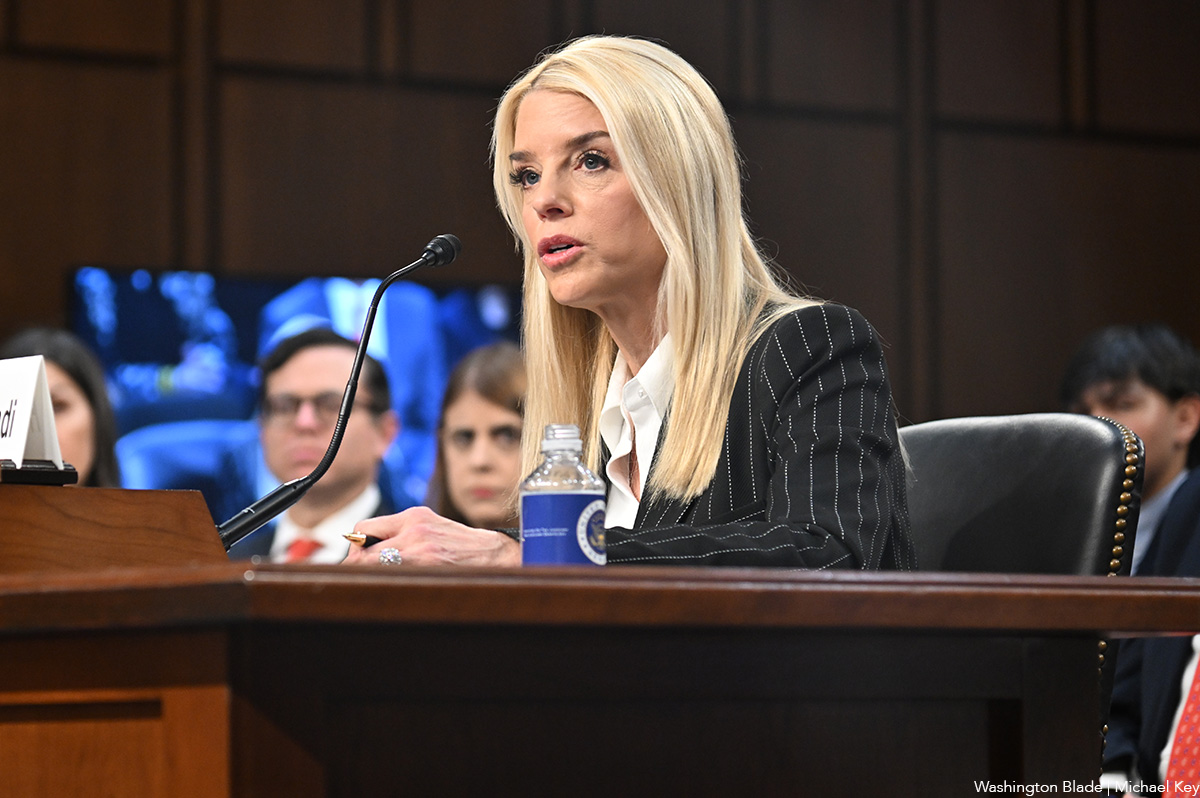U.S. Federal Courts
Federal court: No misgendering transgender students on religious grounds
7th Circuit judge issued ruling in Ind. case

The 7th U.S. Circuit Court of Appeals ruled Friday that a public school teacher does not have the right to misgender a transgender student simply because they’re trans. The court found a religious accommodation could not justify the “harm to students and disruption to the learning environment.”
The 3-judge circuit court panel upheld a Jan. 8, 2020, ruling by U.S. District Court Judge Jane Magnus-Stinson from the U.S. District Court for the Southern District of Indiana.
The case on behalf of John Kluge, who worked at Brownsburg High School in Brownsburg, Ind., as a music and orchestra teacher from 2014 until May 2018, was brought by the anti-LGBTQ legal group Alliance Defending Freedom, which self labels as a conservative Christian legal advocacy group, but the Southern Poverty Law Center first listed as an anti-LGBTQ hate group in 2016.
WISH in Indianapolis had reported that in court documents Brownsburg faculty during meetings in early 2017 began talking about trans students and “how teachers can encourage and support them.” After that, faculty and staff approached the high school’s principal for direction on how to address trans students.
In May 2017, Kluge and three other teachers presented the principal with a signed letter expressing religious objections to “transgenderism,” asking that faculty and staff not be required to refer to trans students by their preferred pronouns. In the letter, they also said they did not want trans students to be allowed to use the restrooms or locker rooms of their choice.
Later in that May, the Brownsburg Community School Corporation district adopted a policy that required all staff to refer to students by their chosen name listed in the school records. According to court documents, “students could change their first names in PowerSchool if they presented a letter from a parent and a letter from a healthcare professional regarding the need for a name change.”
The policy also allowed trans students to use restrooms of their choice and dress according to the gender with which they identified.
Kluge refused and was told by the high school’s principal that there were only three options: Follow the policy; resign; or be suspended, pending termination. He refused to follow the policy or resign, so he was suspended.
Kluge then compromised and presented district officials with two requested accommodations: First, that he be allowed to refer to all students by their last names only, “like a gym coach;” and second, that he not be responsible for handing out gender specific orchestra uniforms to students. He would treat the class like an “orchestra team” he proposed.
According to the court documents, He agreed that, if a student asked him why he was using last names only, he would not mention his religious objections to using trans students’ first names and would explain, “I’m using last names only because we’re a team, we’re an orchestra team, just like a sports coach says, hey, Smith, hey, Jones. We are one orchestra team working towards a common goal.”
School officials began to receive complaints from the Brownsburg High School Equality Alliance students and parents that Kluge was referring to them by their last names only, was a practice they found insulting and disrespectful.
In addition to the complaints of the school’s LGBTQ students, a student who was not in the Equality Alliance but was in Kluge’s orchestra class and who did not identify as LGBTQ, told school administrators that Kluge’s use of last names made him feel incredibly uncomfortable. The student described Kluge’s practice as very awkward because the student was fairly certain that all the students knew why Kluge had switched to using last names, and that it made the trans students in the orchestra class stand out. The student felt bad for the trans students, and shared with that other students felt this way as well.
The principal met with Kluge in December 2017 and told him using last names only was “creating tension in the students and faculty” and told him it might be good for him to resign at the end of the year.
On Jan. 22, 2018, administrators presented the faculty with a document titled “Transgender Questions.” The document provided policies and guidance for faculty in a question/answer format regarding issues relevant to trans students. Among the questions posed and answers given were the following:
Are we allowed to use the student’s last name only?
We have agreed to this for the 2017–2018 school year, but moving forward it is our expectation the student will be called by the first name listed in PowerSchool.
How do teachers break from their personal biases and beliefs so that we can best serve our students?
We know this is a difficult topic for some staff members, however, when you work in a public school, you sign up to follow the law and the policies/practices of that organization and that might mean following practices that are different than your beliefs
What feedback and information has been received from transgender students?
They appreciate teachers who are accepting and supporting of them. They feel dehumanized by teachers they perceive as not being accepting or who continue to use the wrong pronouns or names. Non-transgender students in classrooms with transgender students have stated
they feel uncomfortable in classrooms where teachers are not accepting. For example, teachers that call students by their last name, don’t use correct pronouns, don’t speak to the studentor acknowledge them, etc.
According to WISH, Kluge responded to the document by asking if he would still be allowed to call the students by their last names only.
In a February meeting, administrators told Kluge he would no longer be allowed to continue that practice, saying the “accommodation was not reasonable.” They went on to discuss whether Kluge would finish the school year or resign mid-year and offered to let him submit his resignation and not process it or tell anyone about it until the end of the school year. Kluge told the court the explanation of the resignation process led him to believe he could turn in a “conditional resignation” that he could later withdraw.
In March, Kluge was once again given the same options: follow the name policy and keep working for the district, resign or be terminated. He was told if he didn’t submit his resignation by May 1, the district would begin the termination process.
On April 30, Kluge emailed the human resources director with a formal resignation and asked that it not be shared with anyone until May 29. In the letter, he said he was resigning because of the district’s name policy and the loss of his accommodation.
By late May Kluge then attempted to withdraw his resignation and accused the district of discrimination based on his religious beliefs. At a June 11, 2018, school board meeting, he asked the board members to not to accept his resignation, and then there was a contentious public comments session as members of the community spoke both for and against his termination. The board approved his resignation.
Not long after he filed suit.
Magnus-Stinson in her ruling noted: Kluge v. Brownsburg Cmty. Sch. Corp., 432 F. Supp. 3d 823, 851 (S.D. Ind. 2020) (“The policy controlled the way in which Mr. Kluge addressed individual students during the course of his employment, but did not otherwise affect his ability to exercise his religion in the remainder of his life. Accordingly, to the extent that the Policy limited his religious exercise, the limitation was not so significant as to render the entire idea of free exercise of religion meaningless, because Mr. Kluge remained free to exercise his religious beliefs at other times and in other places.”)
Magnus-Stinson also concluded that a public school corporation “has an obligation to meet the needs of all of its students, not just a majority of students or the students that were unaware of or unbothered by Mr. Kluge’s practice of using last names only.”
Friday’s appellate court decision is likely to be appealed to the U.S. Supreme Court.
Seventh Circuit ruling upholding U.S. District Court Judge Jane Magnus-Stinson’s ruling:
Maryland
4th Circuit dismisses lawsuit against Montgomery County schools’ pronoun policy
Substitute teacher Kimberly Polk challenged regulation in 2024

A federal appeals court has ruled Montgomery County Public Schools did not violate a substitute teacher’s constitutional rights when it required her to use students’ preferred pronouns in the classroom.
The 4th U.S. Circuit Court of Appeals in a 2-1 decision it released on Jan. 28 ruled against Kimberly Polk.
The policy states that “all students have the right to be referred to by their identified name and/or pronoun.”
“School staff members should address students by the name and pronoun corresponding to the gender identity that is consistently asserted at school,” it reads. “Students are not required to change their permanent student records as described in the next section (e.g., obtain a court-ordered name and/or new birth certificate) as a prerequisite to being addressed by the name and pronoun that corresponds to their identified name. To the extent possible, and consistent with these guidelines, school personnel will make efforts to maintain the confidentiality of the student’s transgender status.”
The Washington Post reported Polk, who became a substitute teacher in Montgomery County in 2021, in November 2022 requested a “religious accommodation, claiming that the policy went against her ‘sincerely held religious beliefs,’ which are ‘based on her understanding of her Christian religion and the Holy Bible.’”
U.S. District Judge Deborah Boardman in January 2025 dismissed Polk’s lawsuit that she filed in federal court in Beltsville. Polk appealed the decision to the 4th Circuit.
U.S. Federal Courts
Federal judge in Md. rules against White House passport policy
Lambda Legal represents transgender, nonbinary people in lawsuit

A federal judge in Maryland on Tuesday ruled in favor of six transgender people who are challenging the Trump-Vance administration’s passport policy.
President Donald Trump once he took office signed an executive order that banned the State Department from issuing passports with “X” gender markers. A memo the Washington Blade obtained directed State Department personnel to “suspend any application where the applicant is seeking to change their sex marker from that defined in the executive order
pending further guidance.”
The Trump-Vance administration only recognizes two genders: male and female.
The lawsuit that Lambda Legal filed in U.S. District Court for the District of Maryland in Baltimore in April alleges the policy “has caused and is causing grave and immediate harm to transgender people like plaintiffs, in violation of their constitutional rights to equal protection.”
Seven trans people — Zander Schlacter, Jill Tran, Lia Hepler-Mackey, David Doe, Robert Roe, Peter Poe, and Kris Koe — filed the lawsuit.
Roe is a U.S. Foreign Service Officer who currently lives in Europe. Lambda Legal, who represents him and the six other plaintiffs, notes Chief Judge George L. Russell III dismissed Roe’s case because the State Department has yet to deny him “an accurate passport.”
“Like every other court that has considered this executive order, the court finds its stated purpose does not serve an important governmental interest that is exceedingly persuasive; further, the discriminatory means employed are not substantially related to the achievement of those objectives,” said Russell in his ruling.
Lambda Legal Counsel Carl Charles described Russell’s decision as “a crucial victory for our clients and transgender people nationwide who have been trapped by this administration’s cruel and discriminatory policy.”
“The court recognized that forcing inaccurate identity documents on transgender Americans causes immediate and irreparable harm,” said Charles in a press release. “Our clients can now travel with dignity and safety while we continue fighting to overturn this discriminatory policy entirely.”
The American Civil Liberties Union earlier this year filed a separate lawsuit against the passport directive on behalf of seven trans and nonbinary people.
A federal judge in Boston in April issued a preliminary junction against it. A three-judge panel on the 1st U.S. Circuit Court of Appeals last week ruled against the Trump-Vance administration’s motion to delay the move.
U.S. Federal Courts
AGs sue White House over push to restrict gender-affirming care in blue states
14 states, DC joined the lawsuit filed Friday

A group of 15 Democratic attorneys general and Pennsylvania Gov. Josh Shapiro (D) have accused the Trump-Vance administration of unlawfully pressuring health providers to withhold access to gender-affirming medicine for minors in places where these treatments remain legal.
In a complaint filed in the U.S. District Court for the District of Massachusetts on Friday, the attorneys general outlined multiple ways in which, they claim, the administration has overstepped its authority to restrict care that is protected under state law, such as by threatening providers with meritless lawsuits and federal investigations.
On the first day of his second term, President Donald Trump directed the Justice Department to pursue enforcement actions to proscribe medically necessary gender related interventions, which were characterized in his executive order as “chemical and surgical mutilation.”
Thereafter, the DOJ has issued subpoenas, demanded private patient data, and suggested that criminal charges might be coming — actions that have no legal basis, and instead constitute efforts to strong-arm Democratic states into alignment with the administration’s position on gender-affirming care for minors, according to the complaint.
As a result of these pressures, the attorneys general argue, providers have reduced or eliminated services while patients have reported cancelled appointments and uncertainty over whether they can continue receiving treatment.
Their lawsuit asks the court to block the administration’s actions and halt the enforcement of the executive order along with another that prohibits the federal government from recognizing transgender people or acknowledging that gender identity does not always correspond with one’s sex at birth.
The 15 attorneys general are from Massachusetts, California, New York, Connecticut, Illinois, Delaware, D.C., Hawaii, Maine, Maryland, Michigan, Nevada, New Jersey, New Mexico, Rhode Island, and Wisconsin.



















